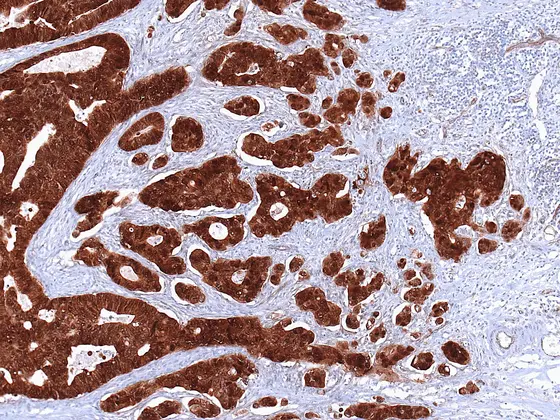Malignant tumors spread through the body through a migration of cancer cells. For this to happen, tumor cells growing in one location have to undergo changes that permit them to migrate and invade other tissues. Growing evidence suggests that this transformation can be triggered by inflammation. A chemical messenger in the body called interleukin 6 (IL-6) plays an important role in this process. Both immune cells and tumor cells release IL-6, which goes on to bind to a receptor molecule called interleukin-6 (IL-6R) on the surface of cells. “We have now been able to show that even a short exposure to IL–6 can lead to lasting changes in cancer cells that enhance their mobility and thus contribute to metastasis," said study head Professor Heiko Hermeking, a researcher at the Institute of Pathology of the University of Munich (LMU).
The scientists studied colon cancer cells in cell cultures to show that IL-6 acts through a feedback loop that depends on a microRNA (an extremely short RNA molecule) called microRNA-34a (miR-34a). Normally miR-34a triggers a protective mechanism that prevents carcinogenesis and metastasis. “The activation of IL-6R cancels this protection," Hermeking says. “The reason is interference from another factor, called STAT3 factor, which becomes activated and prevents the production of miR-34a by suppressing its gene. We also discovered that if miR-34a is produced, it directly inhibits the IL-6 receptor itself. Without it, in cases where the microRNA is repressed, the cell produces more of the receptor." This creates a feedback loop that can either suppress or activate cancer-promoting genes, depending on whether miR-34a or IL-6 has the predominant role.
Since inflammations cause our cells to secrete higher amounts of IL-6, the newly discovered pathway may explain how chronic inflammations contribute to the onset of metastasis. “We have now been able to prove this connection for the first time in vivo in the mouse model," said Hermeking. “We studied mice whose cells are unable to produce the short RNA miRNA-34a in collaboration with Professor Florian Greten of the Georg Speyer Haus at the DKTK partner site in Frankfurt. We discovered that these mutant mice develop inflammation-induced tumors and that they grow invasively. To demonstrate that this feedback loop is also activated in other types of cancer in humans, we studied human breast and prostate cancer cells. Furthermore, an analysis of tumor cells from numerous colorectal cancer patients revealed a link between the activation of the feedback loop and metastasis."
The discovery of the feedback mechanism offers new potential targets for therapeutic intervention. “STAT3 und IL-6 are already targeted in tumor therapy," Hermeking says. “The new study suggests that the small RNA, miRNA-34a, may provide another particular therapy target, for example in treating metastasizing colorectal cancer. We think that diagnostic or prognostic applications may also be possible."
The research projects were supported by German Cancer Aid (Deutsche Krebshilfe) and the German Consortium for Translational Cancer Research (DKTK).
Matjaz Rokavec, Meryem Gülfem Öner, Huihui Li, Rene Jackstadt, Jiang Longchang, Dmitri Lodygin, Markus Kaller, David Horst, Paul K. Ziegler, Sarah Schwitalla, Julia Slotta-Huspenina, Franz G. Bader, Florian R. Greten, Heiko Hermeking. IL-6R/STAT3/miR-34a feedback controls EMT, invasion and metastasis of colorectal cancer. Journal of Clinical Investigation 2014, DOI: 10.1172/JCI73531.
